Review: Idealita Analogi Elegi Brings Relatable Story, Jazzy Score, and Compelling Direction
The show ran on Sunday, October 12 at Teater Salihara.
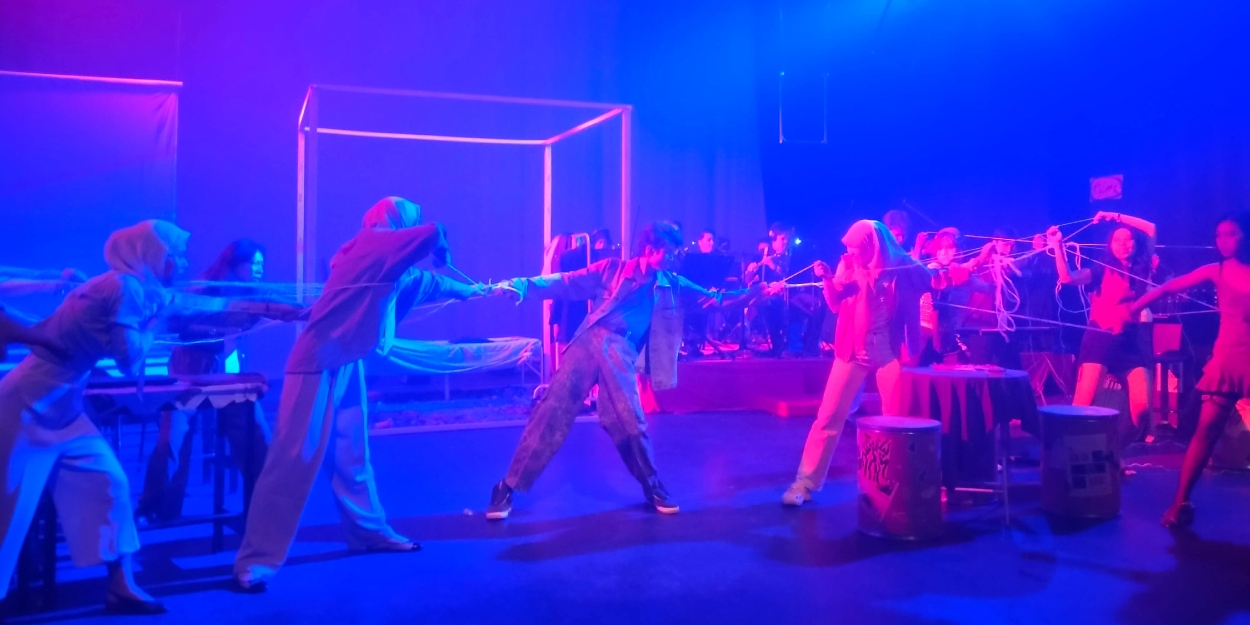
On Sunday, October 12, the musical theater community Svatuhari put on their 13th production: Idealita Analogi Elegi at Teater Salihara. This show is a retooling of Idealita, which ran in June of 2023 (read our review here). The musical still observes the power of idealism and reality set in a contemporary setting, but is otherwise a new theatrical experience.
This time, the production is directed by seasoned thespian Rinaldy Zulkarnain, while Joseph Moris serves as both executive producer and music director. The show also features art direction by Galih Ayu Setyorini, choreography by Nicole Fatka, and vocal direction by Raffel James Astilla Tan.
Idealita tells the story of Ivan (Fahyar Andi Akbar Yasin), a corporate worker who’s stuck toiling in his 9-to-5 job, with the only reprieve being his childhood friend Lita’s (Anastacia Mailoor) encouragement. One day, as he takes the MRT to go home after work, he comes across the only other passenger reading a book – a woman by the name of Dea (Lovely Christie).
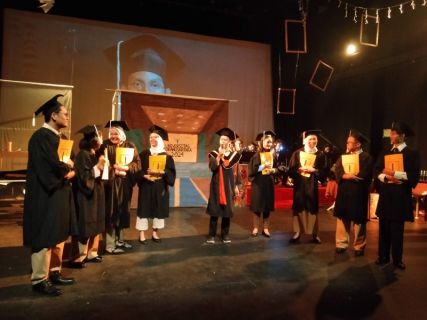
Ivan introduces himself to Dea and the two hit it off upon discovering that they share a love for the arts. Dea brings Ivan to the bar she frequents, Bar de Barr, filled with a colorful cast of nightlife workers and their matron, Mami Kiki (Lydia Napitupulu).
However, as Ivan grows closer to Dea and frequents the bar, he becomes increasingly disillusioned with his work. It culminates in him nearly ruining a big project that Lita is working on, earning the ire of their boss, Alex (Riki Fahlian Ali).
When Lita calls him out on this, Ivan instead decides to run off and spend more time with Dea, even partaking in narcotics that she offers. Not long after, Lita comes to the bar, trying to convince Ivan to go back to work. A brawl ensues and one of the tenants ends up dead. The police come in and arrest everyone at the bar except for Ivan and Lita, who manage to escape. After a moment of reflection, Ivan decides to go back to the office and face reality.
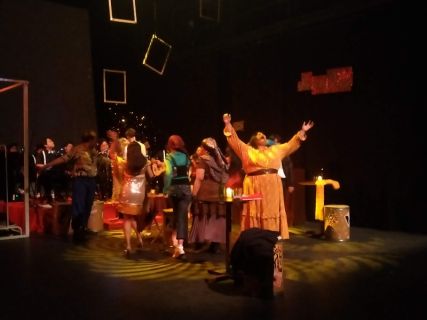
As mentioned before, Idealita Analogi Elegi is a wholly different theatrical experience compared to the first rendition. This is no surprise, considering that the initial production is run by students of the Sanggar Svatuhari training program, who were mostly new to the theater and did the best they could considering their level of experience.
For Idealita Analogi Elegi, Rinaldy Zulkarnain’s strong directorial vision elevates the material, making for a much more consistently enjoyable and memorable show.
As the story concerns itself with the cerebral issue of reality versus idealism, the director has elected to imbue the show with a more impressionistic and theatrical touch. This is most readily apparent in the set and lighting design (spearheaded by Rinaldy and art director Galih Ayu Setyorini).
The stage is split into three areas: the left for the office building (reality), the center for Ivan’s room (neutral), and the right for the bar (idealism). Hanging above the office are sheets of paper, mirrored by the strings of lights above the bar; the areas are also color-coded, with the office being lit in blue and the bar in red, further intensifying the theme of duality. There’s also an LED screen on the back, which is sometimes used to add another layer of storytelling beyond what’s happening on stage – such as the character’s unsaid thoughts. It’s an interesting usage of mixed media, but sometimes it’s hard to tell when we’re supposed to look at it.
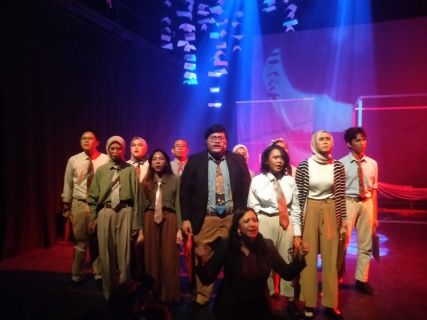
The staging likewise made good use of the reality-bending nature of theater. For example, some scene changes were done by cast members dressed as janitors doubling as stage crew, visibly swapping the backdrop to indicate a scene change. And in some scenes, this backdrop has the scene number and description explicitly written on them – a daring artistic choice that worked with the overall impressionistic approach to the show.
The climactic moment of the story – when Ivan’s internal struggle between chasing his idealism and accepting his reality – was also given a rightfully dramatic treatment. Ivan is metaphorically, and quite literally, pulled between the two sides; he’s tangled in both reality and idealism. The resulting effect was powerful, as we could see Ivan’s dilemma depicted in such a visceral manner.
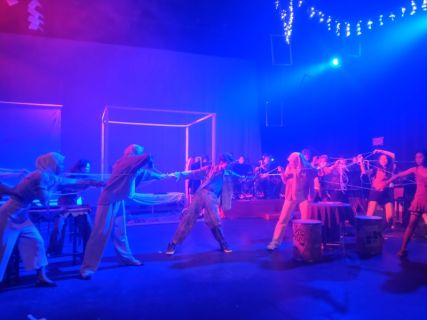
Performance-wise, all the cast members brought solid, believable acting performance. Fahyar Yasin as Ivan was a strong main actor. It was easy to follow the emotional arc that Ivan went through until its conclusion. However, his singing was noticeably not yet as polished as his acting, making his songs not as impactful as they could be.
The two heroines had great chemistry with Ivan, making each of their relationships intriguing. Lovely Christie as Dea has a quirky charm to her character from the very first scene, and a surprisingly strong vocal performance as well. Her solo number Idealismeku especially showcased her dulcet tones beautifully.
As for Anastacia Mailoor, her character easily had the most emotional nuance after Ivan and she successfully and smoothly embodied both sides of Lita – the headstrong office worker and the gentle, concerned childhood friend. Unfortunately, her singing was marred by technical issues, making her hard to hear during her solo number.
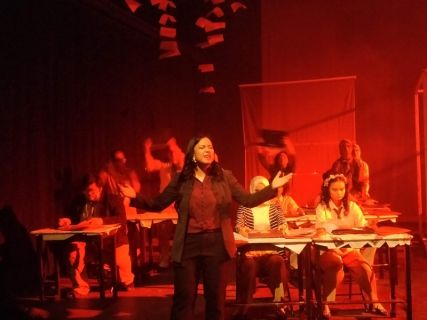
The supporting characters and ensemble were delightful to watch, full of personality and even sass. But the vivacious, fiery bar owner Mami Kiki was definitely the stand out of the evening. With a bold, brash demeanor and velvety smooth voice that was perfectly suited for the jazzy numbers, Lydia Napitupulu’s performance stole every scene that she was in.
Idealita Analogi Elegi featured seven original songs, some of them having been reworked since the first run. Most of the music was made by Joseph Moris, with additional work by Raffel James and Rinaldy Zulkarnain.
The music of Idealita Analogi Elegi has a strong, unique sense of personality, combining jazz influence with contemporary Indonesian pop and musical theater. The stand out numbers for me were the dreamy Idealismeku and the captivating Dilemma. Appropriately, the music team had a saxophonist, trumpeter, and trombonist in their midst to do these numbers justice.

As the show still largely keeps the same script, it also maintains the same strengths and flaws.
Starting from the positives, the story is still as relatable and relevant to Indonesian Millennials and Gen-Zs as it was one year ago; the theater-going audience would surely feel heard and seen. Moreover, the dialogues hit the sweet spot between being theatrical and being realistic. They sounded like they were coming from real people, just a bit more colorful and emotional to make everything more impactful. The jokes also largely went well, although there were a couple toilet jokes that felt rather juvenile and perhaps out of place.
But, once again, the observation of realism and idealism came across as a bit too shallow. The ‘idealism’ argument particularly got the short end of the stick, as we never get to see Ivan actually trying to live his stated ideals – namely, pursuing creative endeavors. Instead, his time at the bar is more accurately a form of escapism, rife with partying, alcohol, and drugs.
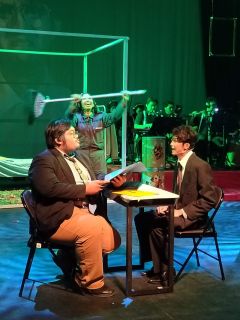
Related to that, the character of Dea is then portrayed as unfaithful, kissing another man in front of Ivan. Meanwhile, Lita was vindicated at the end as Ivan resigned himself to come back to the office. It was never a fair fight; the office life might be a bit stressful, but it was never portrayed as exploitative nor dehumanizing. In contrast, the nightlife was mostly depicted as a den of sin, full of vapid worldly pleasures and even crime. There could’ve been an interesting exploration of how even such a seemingly glamorous life is simply the harsh reality for most, if not all, the workers.
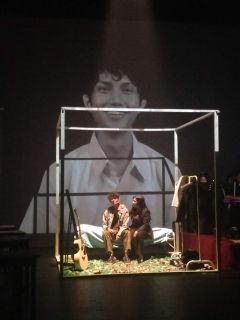
Then again, although the details of the story might still have room for improvement, it still manages to evoke emotions and provide entertainment. And I’m positive it can provoke its audience to think deeper about both their day-to-day reality and their aspirations, and the cost of chasing either. Hopefully, the great success of this production will motivate the creative team to create even better works in the future.
Through Idealita Analogi Elegi, Svatuhari proves that they’re not only able to make a show that resonates with the Indonesian youth, but one that's both inspired and inspiring.
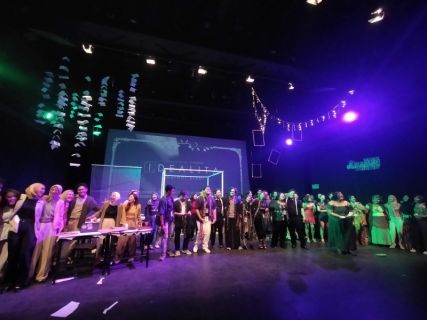
Reader Reviews

Videos
